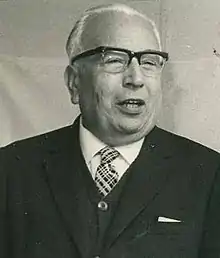Anwar Shaul
Anwar Shā’ūl (Hebrew: אנואר שאול, Arabic: أنور شاؤول, 1904–1984) was an Iraqi Jewish journalist, publisher, author, translator, and poet.
Anwar Shā’ūl | |
|---|---|
 | |
| Native name | أنور شاؤول |
| Born | 1904 Hillah, Iraq |
| Died | 14 November 1984 (aged 79–80) |
| Language | Hebrew, Arabic |
| Nationality | |
Shaul was born in Hillah in 1904 to a second generation Austrian-Iraqi mother and a Mizrahi father.[1][2] He originally trained as a lawyer at the Baghdad Law College, graduating in 1931.[3][4] Shaul served as editor of the Arabic-language Iraqi Zionist journal, al-Miṣbāḥ (Hebrew: אל-מצבאח, Arabic: المصباح), from 1924 to 1925.[5] In his contributions to the publication, Shaul wrote under the pseudonym Ibn al-Samaw'al (an allusion to the poet, Samaw'al ibn 'Adiya).[6]
From 1929 to 1938, Shaul founded and worked as editor of Al Hassid (Arabic: الحاصد, lit. 'The Reaper'), a weekly literary magazine. "The Reaper" featured significant political commentary; mixing harsh criticism of European fascism and advocacy for both Iraqi nationalism and complete political independence from the British Empire.[7][8][9] Under his editorial leadership, Al Hassid, became the foremost Baghdadi weekly.[10]
In addition to his publication of periodicals, Shaul published a number of longer works including memoirs, translations of western literature into Arabic, as well as anthologies of short stories and Arabic poetry.[11]
In 1971, Shaul, who had long been resistant to emigrating despite intensive State-sponsored anti-Semitism in Baathist Iraq, reluctantly made Aliyah to the State of Israel. Shaul lived in Israel until his death in December 1984.[12]
References
- Liberman, Serge (2011). A bibliography of Australasian Judaica 1788-2008. Hybrid Publishers. ISBN 9781921665172. OCLC 668398875.
- Snir, Reuven (2010-10-01). "Shā'ūl, Anwar". Encyclopedia of Jews in the Islamic World.
- The Who's Who of Iraq (PDF). 1936.
- "أنور شاؤول". www.aljazeera.net (in Arabic). Retrieved 2019-01-16.
- "Shaul (Shaool), Anwar | Encyclopedia.com". www.encyclopedia.com. Retrieved 2019-01-16.
- Snir, Reuven. ""Religion is for God, the Fatherland is for Everyone": Arab-Jewish Writers in Modern Iraq and the Clash of Narratives after Their Immigration to Israel" (PDF). Haifa University.
- Goldstein-Sabbah, Sasha (November 2016). "Censorship and the Jews of Baghdad: Reading between the lines in the case of E. Levy". The Journal of the Middle East and Africa. 7 (3): 283–300. doi:10.1080/21520844.2016.1227927.
- Gilbert, Martin (2011). In Ishmael's house: a history of Jews in Muslim lands. Yale University Press. p. 154. ISBN 9780300177985. OCLC 805947788.
- Ginsberg, Morris (1959). The Jewish Journal of Sociology. Vol. 1. World Jewish Congress.
- "Sephardic Horizons". www.sephardichorizons.org. Retrieved 2019-01-16.
- Basri, Meer. "Prominent Iraqi Jews of recent times". www.dangoor.com. Retrieved 2019-01-16.
- Mendelson Maoz, Adia (2014). Multiculturalism in Israel: Literary Perspectives. Purdue University Press. ISBN 9781557536808.